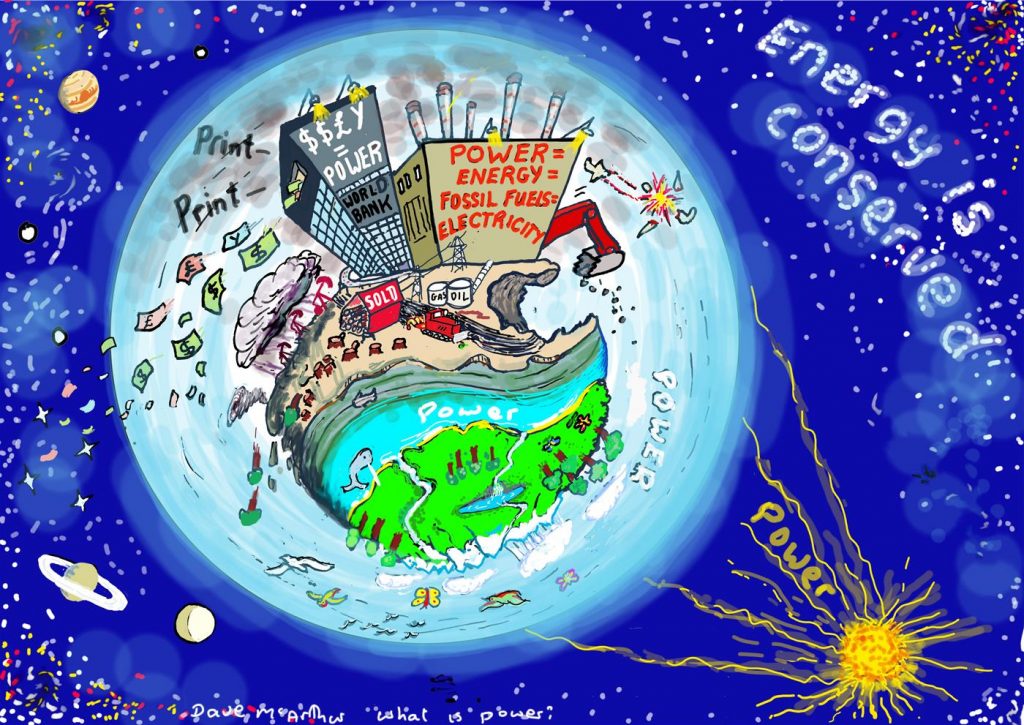
What is “power”?
Ask this question and some people raise a clenched fist.
Some embrace a long car bonnet. Others wave a fist full of money. Some pat their assault rifle or rocket launcher. Others hold up a cross or crescent.
Some gesture to the sun in the sky and speak of energy. Others motion to the heavens and speak of God.
Some nod to storm clouds or flooding rivers. Others look to the electrical wires in the street or the electrical supply socket in the wall of their home.
Some embrace the Bible, the Koran, the I Ching or the Upanishads. Others brandish large, heavy Law Books.
And there are those who go blank while they dredge up their memories of the school “Science” books and then hesitantly volunteer “Er, umm, isn’t power a kind of measure – something to do with measuring the amount of work done in a period of time, something to do with force and energy?”
Who is correct?
Most everyone is, including those who see power in a word or a thought because these too are physical phenomena, as are all forms of energy.
A notable exception is those who conflate “power” with “energy” and “electricity”.
This belief, common among electrical engineers and merchant bankers, is in complete denial of the principles of physics. How so? And why does this confusion matter?
The answer to the second question is relatively simple.
Electrical engineers design, build and maintain our regional systems for manufacturing and reticulating electrical products.
A global cabal of psychopathic merchant bankers effectively own these systems and make enormous short-term profits off them.
This matters because the conflation of energy, power and electrical products is a recipe for dystopia – the engineers have the skills and the merchant bankers can print the money to construct systems that can easily annihilate mankind.
As for the first question, “How is the belief Energy = Power = Electricity in complete denial of the principles of physics?” . This is far more vexed.
What on Earth has Power to do with Energy?
The short answer is everything and nothing – energy is transformation (change), power is the manifestation of change.
A common thesis of this series of essays is that there is a universe in every word, including in the words “energy” and “power”. Some very energetic, powerful people will even go to war in the name of “Energy Independence” and “By The Power of God”. So it is helpful to be clear as possible what we are talking about when we use a word.
“What is Energy?” -the previous essay in this series – discusses how everyone experiences and defines energy in their own unique way. We all live this paradox: each of us is vitally intimate with energy yet no one knows what it is.
For instance, German “energie” has no direct translation in the English language; English engineers, “physicists” and teachers define energy as the capacity to do work; Anglosphere merchant bankers conflate power, electricity and even “fossil fuels” with energy.
So it may be helpful to now first read “What is Energy?”” because it employs a definition of energy that generates a radically different use of the English language to what you may be accustomed to.
In brief, its definition states: energy is the universal potential, all of which is active.
This is the most inclusive and sustainable definition I have come up with in the English language. It has the greatest accord with my understandings of Quantum Physics and the Conservation of Energy Principle. Also the more sustainable cultures in known history have tended to be founded in similar definitions.
Compare this definition to our prevailing Crown dialect of English, which has us speak of two types or forms of energy – “potential energy” (inactive) and “kinetic energy” (active).
This essay speaks of energy being the universal potential, the possibility for anything to happen. Inherent in this definition is the fundamental interconnection of all these myriad possibilities, each one being active in the continuous, universal transformation.
In other words, change is a constant and all our existence involves paradox.
For instance, we all live this paradox of information: we each inform all even as we are informed by all.
One implication of this is that we are all moral beings whether we like it or not. We are always evaluating.
Our survival as individuals, as societies and as a species depends on our ability evaluate the potential of our actions.
Our human condition is such that our existence depends on our capacity to transcend paradox and live more wisely in accord with the universal transformation.
Our wise use of language is central to this capacity. It is vital to our existence amidst the universal information, to our being empowered.
Ancient wisdom: To Name a Thing Calls it into Being
“If language is incorrect, then what is said does not concord with what was meant, what is to be done cannot be effected…”
Confucius in the Book 13 of The Analects
We breathe. Our heart beats. We digest food. We see. We listen. We stand. We walk. We talk…. every action involves myriad calculations, evaluations and decision we are rarely and barely self-aware of. And our self-awareness can cause us to choke, skip a beat, over eat, ignore, be deafened, fumble, stumble, prattle and even endanger ourselves.
These incidents often occur because the exclusive force in our psyche, the ego, has us act in greedy, arrogant, self-deceiving ways. Without the countervailing force of compassion, the ego can easily have us act in delusional ways to the point of self-destruction. Put simply, our language becomes insane – out of touch with reality. We become misinformed, deformed, unformed and unable to use energy in sustainable ways.
This psychology~physics has been understood since time immemorial. It is this wisdom that has sustained our cellular dna in various sentient ways for billions of years before they assumed this human form.
Towards a Sustainable Definition of “Power.”
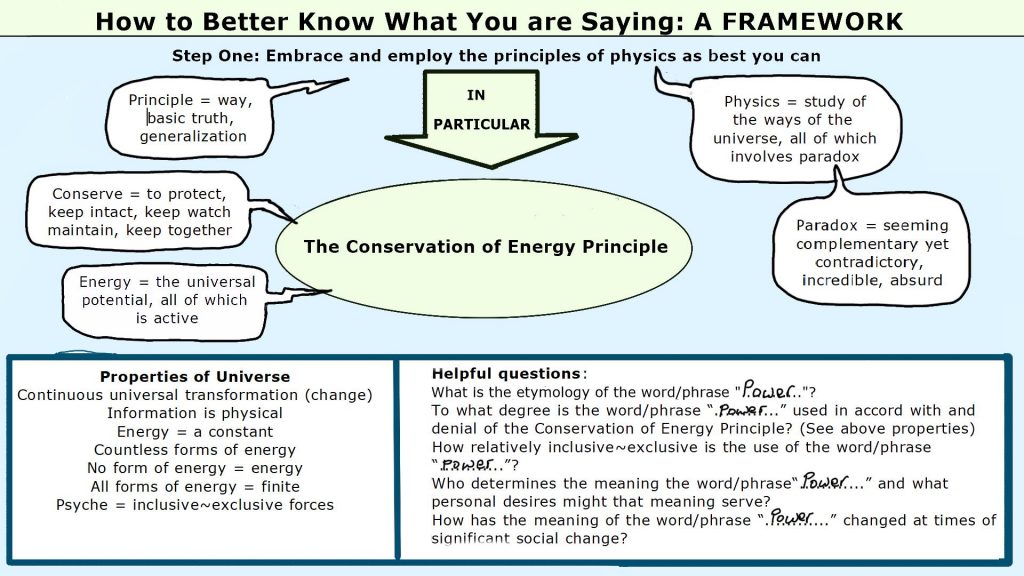
As you can see, psychology and physics are inextricably interconnected – if physics is the study of the ways of the universe, then psychology is the study of the best way to these ways.
Similarly energy and power are also inextricably interconnected: if energy is the universal potential, then power is paradoxically the rate it is manifest.
In other words, power = the measure, energy = the measured.
You may be vaguely familiar with this notion from your school Science days with the equation P = E/T (Power = Energy divided by Time).
Typically your English teachers may have taught you that a unit of power is a watt, this being equal to one joule of energy divided by one second of time. However it probably never occurred to anyone in your class to ask your teacher, “What is time?” Everyone would have just assumed “time” is the clock on the wall determining your school day in terms of hours, minutes and seconds. The school bell was “time”. And perhaps you were too busy anticipating the bell signaling your escape from the classroom to think of ask deep questions about “time”.
However, as discussed in the essay about energy, existence can be experienced in far more subtle, sane and wonderful ways. To quote Einstein again:
“Time and space are not conditions of existence, time and space is a model for thinking.”
So, time being a construct of our psyche, our perception of existence is determined in part by our sensation of time. Hence the degree of balance of the ego and compassion that we experience predicates our use of energy ( the universal potential). The integrity of this psychic balance determines how the universal potential is manifest to us in any moment according to physics.
To give an extreme, graphic example, the ego-driven man (human being) will press the Nuke button or burn mineral oil for reasons of greed, fear, vanity and delusions whereas the more compassionate man refrains from these actions for reasons of generosity, courage, humility and sanity.

Measuring our Ever-Changing Existence
If power is our universal measure of how energy is manifest, then the question arises: how do we best ensure our measure is compassionate and inclusive as possible? Without compassion, the ever-present ego in our psyche will have us measure existence in exclusive, self-destructive ways.
Here are a few, brief suggestions.
Be of inquiring, careful and humble spirit so you are open to as many perspectives as possible. Be inclusive as possible knowing that each and every perspective offers a different measure of the continuous universal transformation with all its countless forms of energy.
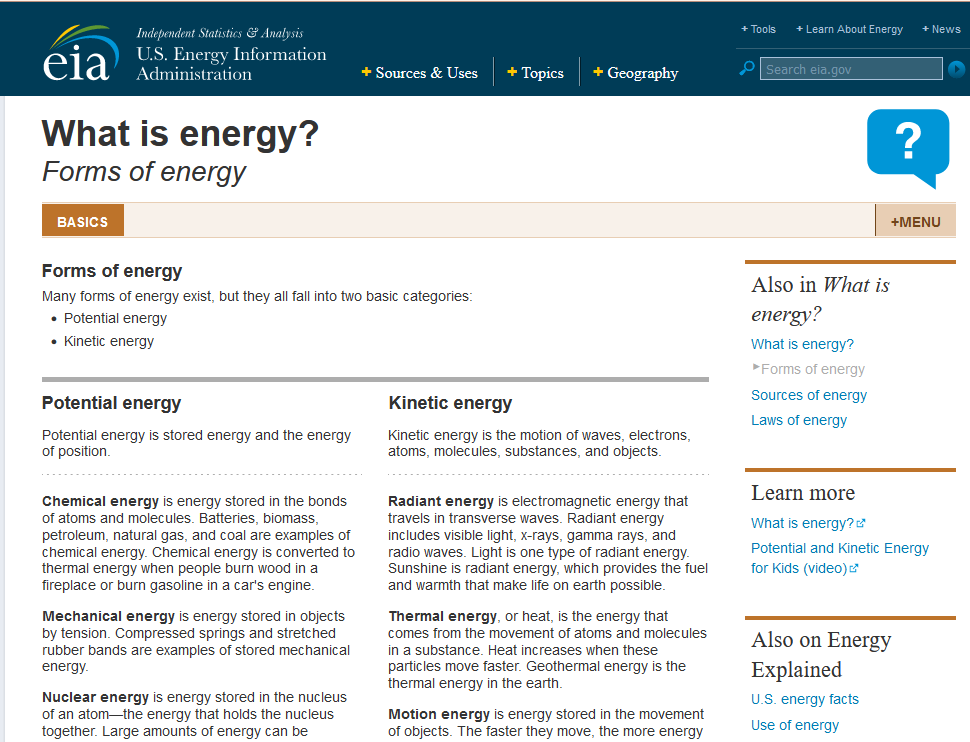
The EIA illustration illustrates clearly how our Anglosphere ethos generates an exclusive dichotomy in forms of energy. By comparison, the compassionate man (human being) understands there are also countless forms of energy and each potentially provides us with a different perspective of existence. Anything, no matter how large or small, can be understood from any of these myriad perspectives, including from chemical, kinetic, electromagnetic, gravitational, nuclear or thermodynamic perspectives… and myriad, myriad other perspectives.
These different perspectives coalesce to enhance our sensibility, better enabling us to more truly appreciate the ways and qualities of any form. In other words the universal potential becomes manifest in greater and more vibrant ways and in turn we are more empowered.
Units of measure
Each perspective comes with its own units of measure, whether they be joules per second (watts), calories per hour, ergs/second, British Thermal Units (BTUs) or, say, in terms of living objects (elephantpower, horsepower, manpower, dogpower, antpower, leafpower, etc). Ultimately we can use any form to measure the power of any other form as long as we have some knowledge of its capacity to effect change.
We make such measurements all the time, the vast bulk of them subliminally.
For instance, we estimate the power of a crouching tiger to be many times greater than that of a crouching kitten and react accordingly.
For instance, our experience may inform us that a horse has the pulling power of about five dogs or the lifting power of about ten strong male human beings.
Our experience of lifting, pulling and pushing an object gives us a shrewd perspective of the power required to move it. Often these actions can be a very humbling experience forming long-term memories of sweat, tears, fears and strained, trembling muscles. Anyone who has tried pushing a car up a hill can attest to that.
The Ego Trap of Technology
Our use of technology radically alters our perspectives in subtle ways we cannot imagine. The reason is any imbalance in the forces of the ego and compassion is amplified exponentially and, when compassion is lacking, the incredible, ingenious ego can easily make us our own worst enemy. It especially thrives in the abstract domains of thought and technology where there is little body-memory of exertion and suffering.
For example, the ego can easily have a car driver, without reflection or concern, simply turn an ignition switch with the twiddle of two fingers and unleash the equivalent power of hundreds of horses or thousands of strong men. Without compassion, the ego can have the driver believe this action is their divine right regardless of the dire consequences for mankind.
Communication technology is an especially potent domain for the ego because this media almost completely bypasses the ancient, residual cellular wisdom of the body. A mere scratch of a pen or tap of a button can record in mathematical language an equation such as E =MC2 or P=E/T
A few more scratches of the pen or taps of a button can inform us that the power of a horse is about 750 watts while the power of a man is only 75 watts while that of a car may be 300,000 watts.
Few Anglosphere people are able to appreciate these power statistics in a meaningful way, particularly if they are speeding along, cocooned in a car on a smooth motor-way and insulated from the power of Earth’s atmosphere and ecosystems.
The more highly educated of these even have the capacity to rigorously calculate the wattage of their vehicle plus its unsustainable rates of mineral depletion and pollution while they are driving… and then rationalize their unique need to keep on driving despite the principles of physics.
Indeed, there is research indicating that students at English universities graduate with enhanced skills as such rationalization they tend to graduate with a worsened imbalance of the ego and compassion.
An Aside: This is not Anglophobia
A brief aside: this is not an Anglophobic diatribe, as it may seem. English is my mother tongue. I am monolingual. My English schools, reinforced by English media in general, disempowered us from learning the languages from other cultures. English rules supreme. Thus I am equipt with few means to measure the relative powers of alternative education systems and cultures in general.
All I can measure of the reality of other cultures is their comparative rates of waste and pollution per capita and we Anglosphere people rate the worst.
This behaviour is consistent with my prime measure of sustainability, which is the degree to which a language is in accord with the Conservation of Energy Principles.
There is overwhelming evidence of a radical, systematic change in the meaning of English has occurred this past three centuries. This change is consistent with the advent of the English Combustion Revolution.
This new dialect of English is radical in that it involves the complete denial of the principles of physics with its measures designed to obscure our roles as stewards, as conservators of the flows and balances that sustain mankind.
Money is the ultimate measure and symbol of power in this culture. All other measures of power are devalued and demeaned in this process, including measures of the powers of healthy soils, stable climate balances, human labour and ultimately even life and energy.
A notable feature of this financial obsession is it suppresses awareness of how an initial tiny change in a state can generate massive changes. This enables dangerous levels of usury (exponential accumulation of interest) and air pollution (exponential accumulation of Warmer Trace Gases such as carbon dioxide and methane.
In terms of psychology~physics, our Anglosphere measures of power have become delusional, subverted to meet the acquisitive, arrogant demands of the ego. Our relative lack of compassion has resulted in our use of words~measures designed to blind us to the greater, sustaining potential of the universe. In other words, our modern Crown dialect of English dis-empowers us in profound ways.
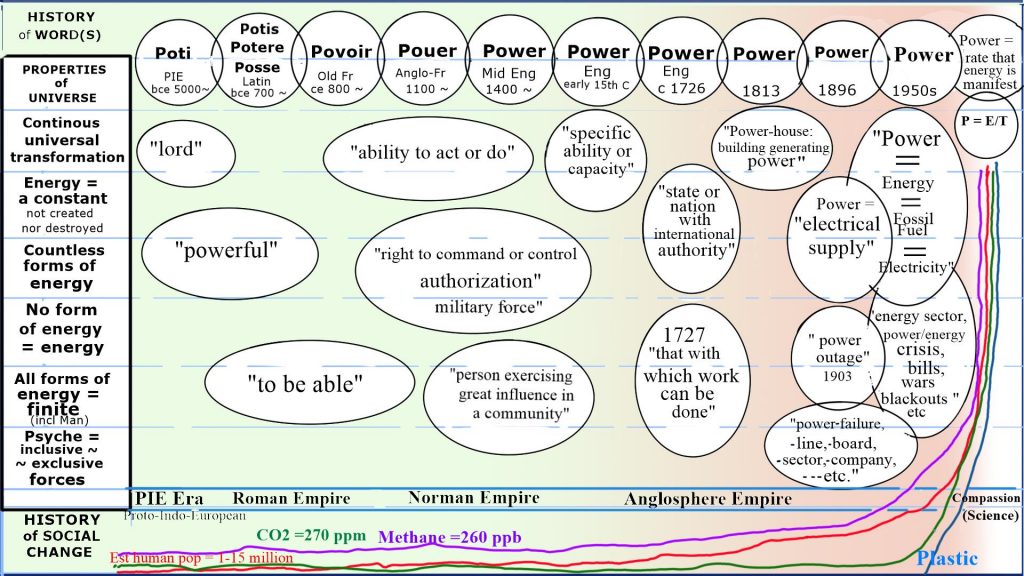
This essay, far from being an Anglophobic diatribe, is actually a celebration in the wisdom and true hope inherent in Pre-Combustion Revolution English This celebration can also be seen at the Wise English Guide on my website .
To summarize the message of this essay in a sentence:
The principles of physics hold: energy is change, power is our evaluation or measure of the rate of change and we conflate and confuse “power” with “energy” at our grave peril.
The truth of this resides as close as our breath and on the tip of our tongue. We have touched on exponential change. Perhaps it is fitting to end with a short foray into Chaos Theory and the evolution of the legend of Khaos and Kosmos.

Each day I gaze from my cottage across the Cook Strait ocean to Baring Head – site of one of the oldest monitors of atmospheric carbon dioxide on planet Earth. It measures change in parts per million of the levels of this Warmer Trace Gas.
I moved here in 1987 – about the time James Hanson was warning the US Congress that human activities could well be disrupting Earth’s climate balances. Global carbon dixoide measured at 349 ppm then, now it measures 416 ppm and the power of this disruption is becoming manifest.
Here in Wellington, the capital city of New Zealand, we have just registered the wettest, warmest July-August winter period since rainfall measurements began. There have been 700 reported landslips in the city. One of those slips included about 30 square meters of soil and sapling forest on my land – steep land that had endured two centuries of English pastoral farming and other abuse.
I had long predicted such an event. Thirty years ago I ceased buying cars, flying in jets and began an odyssey to create a science in the communication of climate care. I envisaged clearly the droughts of Syria, the forest fires of Australia, the floods of Pakistan and the landslides of New Zealand. However the slip, which occurred while I have been writing this essay on the nature of power, has shaken me to the core.
It is not the rampant power of the wind nor the sluicing power of the water nor the awesome power of the land movement has traumatized me so. Rather it is the predictive power of psychology~physics to warn us with such accuracy of the coming climate disruption that has shaken me.
The slip is graphic, visceral evidence that our fatally flawed uses of the English language plus the delusional stories we tell ourselves have made such extreme weather events almost inevitable. The realization of this probability has left me trembling for our children.
So perhaps a brief exploration of history of the word “chaos” is a fitting way to complete these reflections on the nature of power.
Elsewhere I have discussed the rise in the 19C of the Greenhouse World Religion with the English Combustion Revolution with its beliefs that Earth’s atmosphere works like a greenhouse and humans have the power to engineer it at will.
I explain why our policy makers speak of “greenhouse gases” rather than “warmer trace gases” because “GHGs” conveniently obscures the reality that a few extraordinarily powerful trace gases (measured in parts per million) sustain the thermal balances that enable life as we know it.
In the 1960s Edward Lorenz, a meteorologist, while performing computerized weather simulations, observed how tiny differences in initial conditions can generate massive changes in later states. This insight begat the study of “surprises” and a science of the nonlinear and the unpredictable, It opened us to the wondrous world of “the butterfly effect”, “strange attractors”, self-correcting “disorder” and fractals.
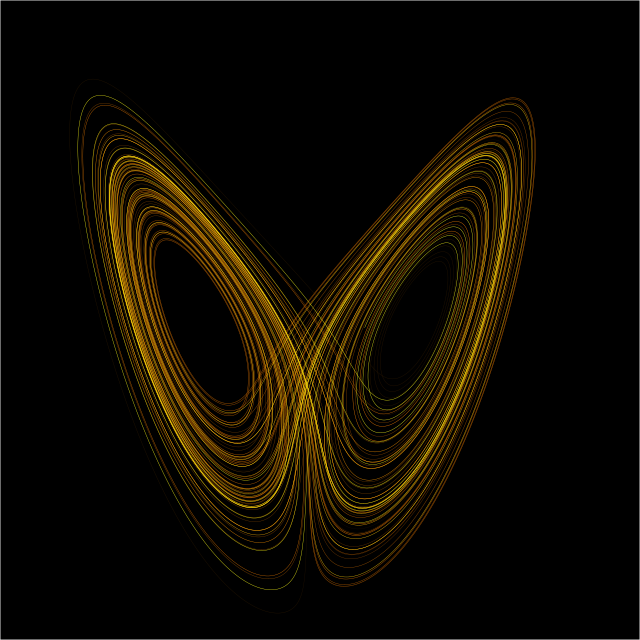
Just as astrophysicists named the regions of most dense matter in the universe “black holes”, maths-physicists in 1977 gave this study of exponential change the name of “Chaos Theory”.
This is unhelpful because nowadays the word “chaos” is commonly associated with a state of disorder and utter confusion. So just what are astrophysicists and Science writers informing us when they say “chaotic systems are everywhere and dominate the universe?”
Perhaps Frederick Lenz is more correct and compassionate:
“Chaos theory simply suggests that what appears to most people as chaos is not really chaotic, but a series of different types of orders with which the human mind has not yet become familiar.”
Frederick Lenz
The word “chaos” arose millennia ago from the Proto-Indo-European word “ghieh” which meant “to yawn, gape, be wide open”. This gave rise to Ancient Greek “khaos” – “abyss, that which gapes wide open, that which is vast and empty.” It played a central role in creation legends, as can be seen in the quote from
“KHAOS (Chaos) was the first of the primordial gods (protogenoi) to emerge at the dawn of creation…
…Khaos was the lower atmosphere which surrounds the earth–both the invisible air and the gloom of fog and mist. The word khaos means “gap” or “chasm” being the space between heaven and earth. Khaos was the mother and grandmother of the other misty essences… Nyx (the night) and Hemera (the day)… She was also a goddess of fate…As the goddess of the air Khaos was also the mother of birds, just as Gaia (the Earth) was the mother of land animals, and Thalassa (the Sea) was the mother of fish.
Late classical authors redefined Khaos as the chaotic mix of elements which existed in the primordial universe, conflating it with the primal “Mud” of the Orphic cosmogony. The modern English word “chaos” derives from this….”
https://www.theoi.com/Protogenos/Khaos.html
A pattern emerges. Khaos (chaos) was the living embodiment in our psyche of our breath and the greater atmosphere of Earth. It formed a great potent, compassionate force in our lives interfusing our souls with air. However over centuries the power of this force diminished until it was a mere thought process in our lives our psyche typified by the Greek discourse or dialectic between Khaos (a disorderly universe) and Kosmos (an orderly universe).
The ego thrives in the relative absence of compassion and our arena of thought provides it with prolific opportunities to exert its powers.
The dialectic between Khaos and Kosmos is rich in such opportunities. Such dialectic forms a fertile realm in our psyche for the ego to propagate divisiveness, acquisitiveness, exclusivity and all its other powers.
When compassion is lacking
Without compassion, the ego can easily have us say one thing, do the opposite and remain oblivious to the dissonance of our ways.
Without compassion the ego can easily have us believe and act as though we exist above and beyond the order and disorder of the universe(s). We come to believe we uniquely exempt from the principles of physics and can act at our will.
We fail to question the statement “Chaotic systems are everywhere and dominate the universe. ” (https://www.space.com/chaos-theory-explainer-unpredictable-systems.html )
We end up feeling the universe is a hopeless mess and doesn’t make sense. We conclude we are powerless, and lay all the blame the universe for our woes.
Transcending the Paradox of Power
Recall how this essay defines power as our measure of the rate the universal potential (energy) is manifest; states all physics involves paradox and defines psychology as the study of the art (skill) of transcending paradox.
There are countless paradox of power. Here are a few variations:
• Any form is informed by all the universal transformation even as it informs all.
• All forms are of energy; no form is energy.
• We are the measure by which we are measured.
• Our choice of measure determines that which is measured.
• Our measure of the rate of change is the measure.
• All forms have power; no form is power.
• Each of us empowers all even as we are empowered by all.
• The power of the medium – including any word – is the message.
• The more we grasp for power; the more it slips away.
• …but the meek, humble and generous shall inherit the earth; and shall delight themselves in the abundance of harmony with all.
The last paradox is a paraphrase of Psalms 37:11 from the Christian bible and the wisdom of many other cultures. However it forms an anathema in our modern English culture/ Its ego-driven belief system associates compassion and its qualities of humility, meekness and generosity with weakness and powerlessness .
Conclusion
“Power” is neither bad nor good. However it is essential we employ language that enables us to measure the ever-changing universal potential so it can be manifest in most sustaining and joyous ways possible. Hence it is helpful to ensure we use the word “power” in most compassionate (inclusive way) possible.
In other words we understand “power” is of everything and is no thing. We conflate power with energy at our grave peril.
Essays in this series:
Medium part 1 Tongue-tied by the English Language
(On untying the bonds of the mother tongue)
Medium part 2 What’s in a Word?
Medium part 3 What is Energy?
Medium part 4 What is Power?
Medium part 5 What is Economy?
Medium part 6 What is Warming- Up?
Medium part 7 What is a Fossil Fuel?
Medium part 8 What is a Resource?
Medium part 9 What’s with The Ego~Compassion

